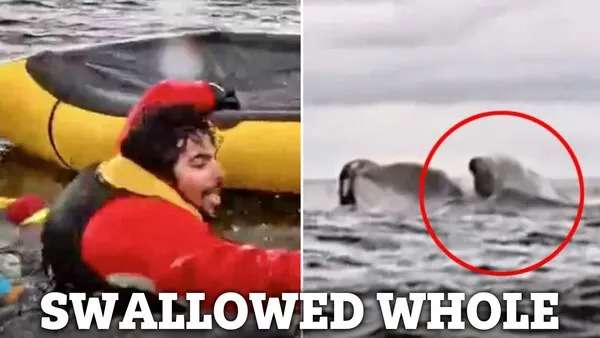You can now listen to Antigua News articles!

Kayaker swallowed whole by humpback whale
by Mick the Ram
A kayaker had a remarkable escape when he was swallowed whole by humpback whale as he paddled through the Strait of Magellan, off Chile’s Patagonian coast.
Adrián Simancas was with his father Dall when the astonishing incident took place down the coast from Punta Arenas, the South American country’s southernmost city.
The 23-year-old said he felt something hit him from behind and his ordeal was over in just a few seconds, although the Venezuelan national described how it felt like an eternity.
The whale actually spat the adventurer out and his father was able to capture the amazing occurrence on a 360-degree camera mounted to his own raft.
Wildlife experts have explained that Humpback’s have very narrow throats meaning that they physically cannot swallow large objects.
They are however huge in size, with an average size of around 60 feet (18 metres) in length and whilst they are unlikely to wish any harm on humans, they are able to cause serious injury if they strike unintentionally.
Having a whale of a “slime”
Bringing a sense of humour to the incident, the biggest lasting impression left on Adrián was seemingly the slime the humpback whale emitted.
He admitted that at first, he thought he had been eaten by some sort of sea monster and his immediate concern was how he might survive inside the creature’s body in a similar fashion to Pinocchio.
“I saw dark blue and white colours before feeling a slimy texture brush against my face,” he said. “I closed my eyes, and when I opened them again, I realised I was inside the whale’s mouth.”
Caught on camera
He remarked that he felt like he was in a whirlpool before recalling how he suddenly started to feel as though he was rising toward the surface. “I was a little afraid of whether I would be able to hold my breath because I didn’t know how deep I was, and I felt like it took me a long time to come up.”
Close by Adrián’s 49-year-old father Dall watched on in disbelief. He spoke of how he was very worried for a few seconds before seeing his son come back up from beneath the water. He had set up the camera to capture the waves, but instead recorded a truly astounding event.
Thankful not to actually see it
Adrián later commented that he felt he had received a “second chance” when the whale spat him out. Watching the footage back, he admitted that he was shocked to see just how enormous the whale had been.
“I hadn’t seen the moment when the back appears, and the fin is visible. I didn’t see it, I heard it; but later, with the video, I realised that it actually appeared before me in such a huge size that perhaps if I had seen it, it would have scared me even more.”
Not going to be eaten
As terrifying as the incident would have been, in reality Adrián was never in any danger of being eaten alive.
The Humpback whale’s throat is similar in size to that of a regular household pipe and is designed for swallowing small fish, krill and shrimp, so a human was never going to fit into such a small oesophagus.
Accidental meal
Brazilian conservationist Roched Jacobson Seba suggested that the whale, in all likelihood, engulfed Adrián by accident, and was probably feeding on a school of fish when it unintentionally scooped up the kayak along with its meal.
“When whales surface too quickly while feeding, they can accidentally hit or engulf objects in their path,” she explained.
María José Pérez Álvarez, a marine biologist at Universidad de Chile and Base Millennium Institute went further by adding: “Humpback whales do not have teeth, but rather brush-like plates they use to trap and filter their prey, so it could not have bitten him either.”
Warning from specialist
As a result of the incident, kayakers in the area have been urged to observe caution. Guillermo Meza operates a company specialising in kayaking tours and worries that the pair had been too far out at sea and also got far to close to the whale.
“I would never have gone that far into the open sea on an inflatable raft, and we always advise maintaining distances of more than 100 metres, and if they get close to us, we stay completely still.”
Chilean law stipulates that legal sighting distances must be at least the 100 metres that Mr Meza spoke of, from any whale.
Respect for nature
The father and son duo had been celebrating Dall’s birthday, and had started their journey at Fin de Camino which marks the end of the road on the continent, and one of the southernmost places in the world.
They insisted that neither of them saw the whale nor intentionally approached it. “The sea was very calm and we were reaching the end of the bay when the whale appeared; we didn’t see any schools of fish or any type of strange movements. The whale lunged from behind and it was a total surprise,” Adrián said.
He went on to remark that the experience had left him with a deeper respect for nature, and that he will take even greater safety precautions in future, particularly with regards to staying closer to the shoreline.











0 Comments